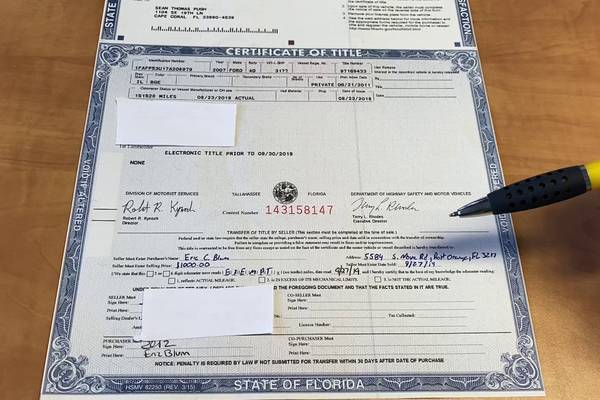
What Does WT-L-BHP Mean On a Florida Title? (Fill Out Guide)
Your guess is as good as ours. Every state has its own way of registering vehicles and RVs. Florida is no exception and often you will find some of its codes confusing. Like this one. However, the state nor anyone else seems to be able to explain it clearly or knows what it means
We are not sure as no one makes a plausible explanation. We looked on the application for a Florida title and came across 3 empty squares. One was labeled weight (WT), the next one was labeled Length (L) and the final one was BHP/CC (BHP). Those answers may produce the WT-L-BHP code everyone is wondering about.
To learn more about this topic, just continue to read our article. it has the information you want to know about. It is designed to help figure out this code and what it means. Take a few minutes to see if this information solves the puzzle for you or not.
What Does WT-L-BHP Mean on a Florida Title?

As far as we can tell, this code refers to weight, length, and Brake horsepower, the amount of horsepower from the engine to the dynamometer. Some people have suggested it is the amount of weight that a Jake brake could handle.
That suggestion was quickly dispelled. And we looked wherever we could to find a logical explanation. There was none on the internet as most owners do not know what it means.
According to one source, the WT-L-BHP refers to the empty weight of the motorhome or vehicle being registered. The number under that code is the gross vehicle weight or the maximum amount of weight of the vehicle.
If this is true, then the L-BHP will never be generated and you won’t know what it is by the title. We say ‘if this is true’ is because the information was found on an English to Polish website and the one providing the answer was not an official of the Florida DMV.
We suggest you call the Florida DMV to get the right answer. Nothing beats going to the people in charge of the code.
What is a State of Florida Application For a Vehicle Vessel Certificate of Title?

This is the formal step in registering your vehicle with the State of Florida. All vehicles, with a few exceptions, that are owned and operated in the state must be registered.
This requires filling out the application form. There are three methods that you have to fill out this form. The first is that you are bringing a vehicle into the state; the second is when you are buying a new vehicle; and the third is you are buying or selling a used vehicle.
All the application does is get you the title to the vehicle. The latter is just proof of ownership. The exemptions to this process are mopeds, motorized bikes, and trailers weighing under 2000 pounds.
The complete process goes like this:
- fill out the application form
- present proof of insurance
- submit a Florida Insurance affidavit
- pay your fee
The fees vary. They can go between $75 to $90 approx and some situations may require you to pay over $200. If you want same-day service, add in an extra $10 with your registration payment.
The adequate proof of auto insurance in the state must meet one of the following requirements:
-Florida auto insurance card
-Florida insurance policy
-Certificate of insurance
-Binder
-A completed original affidavit signed by the insured driver
Keep in mind that while your application is pending, the Florida DMV will verify the VIN to make sure the one on the car or RV, etc., matches with the VIN listed on the application form.
Also, if you are moving to the state and bringing a boat with you, you need to register your boat as well. They must also have a title and you can get the right form at the tax collector’s office or a license plate agent's office.
How do I Fill Out a Florida Title Application?

If you are bringing a car or RV into the state, this is a form you have to fill out. You can get one from the tax collector’s office or a license plate agency that is close to you.
Then you need to fill in all the boxes, check the right spots, and so on. Then it has to be signed by both the seller and the buyer. But the first thing that should be done is for a Notice of Sale to be filed first before the sale is finished.
According to the Florida DMV, this is the process you need to follow:
“When you sell a vehicle or vessel you need to protect yourself by filing Form HSMV — Notice of Sale. Once you file the Notice of Sale Form to the Tax Collector's office, according to Florida Statute Section 319. 22(2), you will avoid civil liability for the vehicle or vessel. This means if the buyer gets in a car accident you won't be liable.
Filing this form, allows the DMV / Tax Collector office and DMV database to be updated and the title of the vehicle or vessel will be marked sold. The ownership status will not change until the buyer applies for and is issued a Certificate of Title. The Certificate of Title needs to be filled out by the buyer and signed by both the seller and buyer and submitted to a local Tax Collector's office.”
Some Final Words
You should talk to the Florida DMV first before beginning the transaction. There is information on the internet but most of it applies to boats not cars. They will have the right instructions and forms for you to fill out.
It is always best to go to the people who create the process to get the right information.

